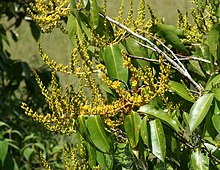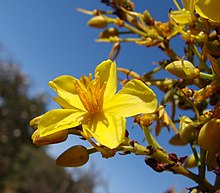Ouratea
Appearance
| Ouratea | |
|---|---|

| |
| Ouratea brevicalyx leaves and inflorescences | |
| Scientific classification | |
| Kingdom: | Plantae |
| Clade: | Tracheophytes |
| Clade: | Angiosperms |
| Clade: | Eudicots |
| Clade: | Rosids |
| Order: | Malpighiales |
| Family: | Ochnaceae |
| Subfamily: | Ochnoideae |
| Tribe: | Ochneae |
| Subtribe: | Ochninae |
| Genus: | Ouratea Aubl. |
| Synonyms[1] | |
| |
Ouratea is a genus of flowering plants in the family (Ochnaceae).[2][3] It includes over 290 species native to the tropical Americas, from Mexico and Cuba to southern Brazil, to Cameroon and Gabon in West-Central Africa, and to Ascension Island in the South Atlantic. Most species are native to the Americas. There are two African species, Ouratea batesii and Ouratea stenophylla, and Ouratea lessonii is endemic to Ascension.[1] Many genera have been brought into synonymy with Ouratea, including Gomphia.[1]

Species
[edit]Species include:
- Ouratea brevicalyx
- Ouratea elegans
- Ouratea glomerata
- Ouratea insulae
- Ouratea jamaicensis
- Ouratea patelliformis
- Ouratea prominens
- Ouratea tumacoensis
- Former species
- Ouratea amplectens → Campylospermum amplectens
- Ouratea quintasii → Rhabdophyllum arnoldianum
- Ouratea schusteri → Campylospermum scheffleri
References
[edit]- ^ a b c "Ouratea Aubl". Plants of the World Online. Royal Botanic Gardens, Kew. Retrieved 2023-04-23.
- ^ "Global Species : Ouratea (ouratea)". www.globalspecies.org. Retrieved 2017-11-23.
- ^ "Ouratea perseifolia • Earth.com". www.earth.com. Retrieved 2017-11-23.
![]() Media related to Ouratea at Wikimedia Commons
Media related to Ouratea at Wikimedia Commons
